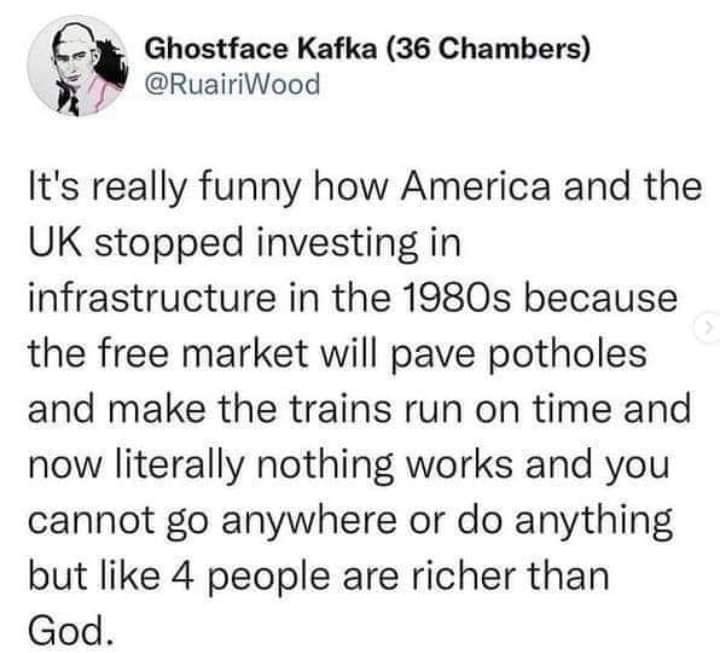this post was submitted on 10 Apr 2024
1569 points (97.6% liked)
tumblr
3550 readers
299 users here now
Welcome to /c/tumblr, a place for all your tumblr screenshots and news.
Our Rules:
-
Keep it civil. We're all people here. Be respectful to one another.
-
No sexism, racism, homophobia, transphobia or any other flavor of bigotry. I should not need to explain this one.
-
Must be tumblr related. This one is kind of a given.
-
Try not to repost anything posted within the past month. Beyond that, go for it. Not everyone is on every site all the time.
-
No unnecessary negativity. Just because you don't like a thing doesn't mean that you need to spend the entire comment section complaining about said thing. Just downvote and move on.
Sister Communities:
-
/c/[email protected] - Star Trek chat, memes and shitposts
-
/c/[email protected] - General memes
founded 2 years ago
MODERATORS
you are viewing a single comment's thread
view the rest of the comments
view the rest of the comments

Do you not see how socializing more industries would aid in the redistribution of wealth?
Redistribution of wealth does not solve the innate problem of a certain class of people having power over another. What it does is temporarilly solve that problem while still leaving room for the owner class to gain more power over the working class.
The only way to prevent massive wealth inequality from occuring is to give the working class the power to control the means of production.
For example, let's pretend that the taxi industry was completely socialized. A new paradigm that performs a similar function in a more convenient way will come along (Uber, Lyft, etc.) and take back control and then proceed to exploit their workers (ie: classifying them as independent contractors instead of employees, taking massive fee percentages, not being transparent about said fees). Since this new paradigm is more convenient for the consumers, the older, taxi industry is left to essentially rot and become obscelete, while the new, unregulated (or less regulated) one that is not owned by the workers takes over almost completely.
There is also the fight for privitization of already public utilities, or to create new, private utilities. Good examples (in the US) are toll roads and schooling. Toll roads are built by private corporations in order to charge a fee for those who drive on them (obviously). People then come to rely on them, and a public alternative isn't built due to the existence of the toll road making a public freeway redundant. College has remained private, regardless of the fact that a college degree is equivillent to what a high school degree used to be when it comes to job prospects. There is also a push to privitize public schooling by extremist conservative politicians, like Betsy DeVos.
I understand the benefits and opportunities of pure socialism. I asked your opinion about the current system because I’m aware of the international implications of dismantling our economy in favor of a new one. We are heavily reliant on imports and exports, and I don’t think you’ve really considered what life would be like after the US Dollar deflates from said upset. Unless you want to start eating dent corn, you may want to rethink your ideas as transitional steps toward a common goal.
I'm not advocating for a complete dismantling of the economy, nor am I suggesting that we do not trade with other countries, but instead, I'm advocating for forcing any company who has more than x number of employees to be a worker-owned co-op, Richard Wolff-style.
I am not against social democracy, and I do think that it is a step in the right direction, but I do think that we, as a society, should go that one step further to prevent the regression back to pure capitalism, since social democracy leaves that door open.